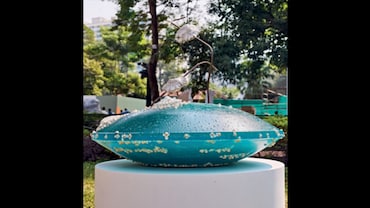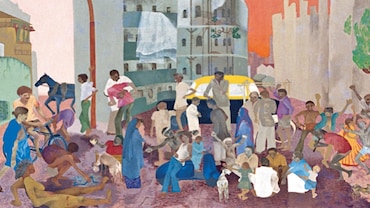- HOME
- /
- Culturescape
- /
- Book Extract
- /
A Case of Mangoes
We can all agree that the ‘king of fruits’ is perfection, but what does our love for it say about us?
 Alamy
Alamy
A few years after my father’s death I met a friend of his, a journalist from Kashmir. He recalled travelling with my father in rural Kashmir one time, through apple orchard country. It was harvest season and my father felt like eating fruit. The friend had the taxi stopped and was about to look for the caretaker. My father stopped him; he said fruit obtained by permission does not taste as good as that plucked from the tree, without a say-so.
They walked in and helped themselves to a couple of apples. Right on cue, the gardener arrived. He saw two primates, approximately seventy years of age, munching on his produce.The friend told him, in Kashmiri, what my father had said. He laughed. Then he gifted them some fruit.
Fruits drive us crazy; none more so than mangoes in India. A fruit vendor in northern Delhi left fifteen crates of mangoes unattended during an altercation with somebody three months into the Covid-19 pandemic, on 23 May 2020. Passersby pounced on the crates and looted mangoes worth Rs 30,000. Ordinary people, not criminals! Bystanders shot videos; it became a story read and watched widely.
Then, those who had seen the report on TV poured in with offers of financial help. The vendor later said he was overwhelmed by the support. I witnessed a similar scene in Varanasi. In front of the Central Office of the sprawling campus of the Banaras Hindu University are old trees of the famous Langda variety. On an overcast day, pre-monsoon showers and windy storms were brewing. As I spoke to the young man who had bought the contract to harvest the mangoes from those trees, a gust of wind caused fruits to drop from the branches; Langda drops easily. It was a working day, and the place was overrun with students, teachers, staff, and families. The moment the fruits fell, people lost all civility and ran like monkeys after it. Some got out of their cars or jumped off their scooters to help themselves. Even the security guards!

The contractor stood by, laughing at people behaving like kids in a candy store. His nonchalance surprised me. Was he not bothered by his income disappearing? ‘Unlike in an orchard, fallen fruit is free for all here. I cannot stop anybody, so why sweat it. Each person is equivalent to the vice-chancellor when she or he is gathering fallen fruit,’ he said.
I watched the faces of middle-aged people dressed for respectable jobs, carrying briefcases; they beamed in embarrassed delight. They knew that it was indecorous to run after fruit in this manner, yet they broke into peals of delirious laughter. They were helpless. Something inside drove them to gather the fruit. Looking for the mango’s origin takes us to our own natural history.
Angiosperms have an uncanny grip over primates. When they needed fresh talent for seed dispersal, they experimented with their remune-ration packages. We have been shaped by the advertising bling of flowering plants. The language of desire works in the grammar of colour, fragrance, and sweetness. Angio-sperms’ generosity has earned our loyalty.
Yes, we have come a long way from our arboreal origins. While all primates have some ability to stand upright, the straightening of the human back is a dramatic adaptation. It has freed up our hands for hunting and farming plants and livestock, turning us into bipedal omnivores (at the cost of backaches).
Well before civilization, our ancestors had walked out of Africa to all continents except Antarctica. We have the most diverse diet ever known in the animal kingdom. To grow grain-producing grasses such as wheat, rice, and maize, we have deforested large swathes. We have exterminated a large number of animal species, some by hunting but most by destroying their habitat. We have replaced wildlife with domesticated animals for dairy and meat. We do not need to jump from branch to branch to avoid predators. Now, we sit in office chairs, our stereoscopic trichromatic eyes staring at computer screens and mobile phones, using our large brains to meet deadlines and surviving predatory bosses.

We do not like to see ourselves as primates shaped by fruiting trees. We like to believe we are in control, civilized, and rational and scientific—a view not supported by science. Over the past 10 millennia, we have colonized the entire planet. Our ancestors have created diverse fields of enquiry, allowing us to gather and record knowledge, generation after generation. We worship our ancestors, displaying them in paintings and sculptures in public spaces. Emperors and explorers who founded empires. Philosophers who conjured classical cultures. Prophets who created religions. Founding fathers who created nations. Law-givers and makers of constitutions. Ideologues who gave birth to political movements. Scientists who laid down the secrets of the universe in magically pithy formulae. Inventors who gave us the printing press and the internet. Hindus reserve an auspicious fortnight before the festive season for the fathers (Pitrapaksha) followed by a nine-day celebration for the mothers (Matrapaksha). Ancestor worship permeates each and every human field. All except our natural history.
Evidence showing our descent from tree-dwelling primates mounts day-by-day. But far from acknowledging it, we keep ourselves firewalled, embarrassed by our humble arboreal origin. Words like ‘ape’, ‘simian’, and ‘monkey’ are derogatory, like ‘villager’, ‘bumpkin’, and ‘wild’. Desperate to keep the natural world at a civilized arm’s length, we look for ancestors who suit our aspirations. But the wilderness does not leave us.
The sign of corporate success is a corner office atop a skyscraper or a penthouse, gazing down at downtown bustle. Exactly how primates see the world from treetops! For a vacation, we need to escape to the forest. Joy is still cooking outdoors in large groups. To seduce a mate, we use flowers. Vegetative metaphor decorates our romantic verse. For a touch of excitement, we compare our sex organs with fruits and flowers. Our desire for fleshy fruits has taken them across the world, far beyond their natural habitats. The apple of Kazakhstan is grown in Australia and the Americas. The mango has spread across the tropics and the sub-tropics. Fruit trees are planted wherever conditions permit. When we present a basket of mangoes to grease a business relationship, we use a very old partnership. Even as we cut down the forest, we convert fields into mango orchards.
We plant mango seeds in the plains, on mountains, plateaus, and in deserts. We graft mango branches and grow them in gardens, looking after them like our children. We set up university departments to research them. We write books on the mango, even though it remains a wild and untamed partner. I cannot find a more successful example of human resource management.
Excerpted with permission from Mangifera Indica: A Biogrpahy of the Mango by Sopan Joshi, published by Aleph Book Company. Copyright © Sopan Joshi 2024.






